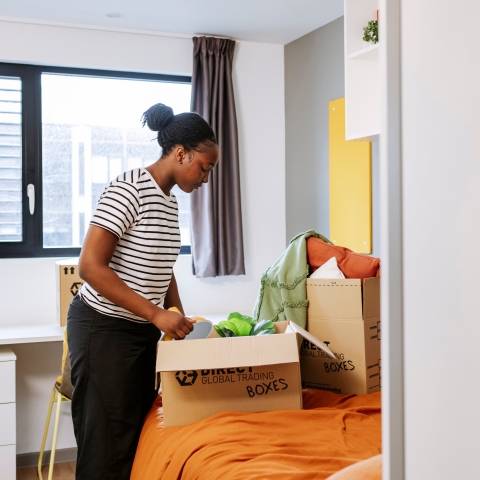
Accommodation and renting advice
Contacting the Student Housing Team
You can contact the team Mon to Thu, 8.30am - 5.00pm and Fri 8.30am - 4.00pm by phone on 023 92 843214, or email on student.housing@port.ac.uk.
Questions about living in halls
In halls, you can have one guest to stay for up to three consecutive nights and a maximum of six nights in one calendar month.
We recommend that you let your flatmates know if you're expecting a guest.
Your responsibility for guests
You're responsible at all times for your guest's behaviour and actions. This includes being responsible for (and paying for) any damage that your guest may cause.
All overnight guests must be over 18 years of age.
For students living in a single sex area, all guests should be of the same sex.
If you lose or forget your key/access card or if you're locked out of halls, ask at reception for a staff member to allow you access to your room. Please note there may be a delay in gaining access.
For third party halls (Greetham St, Rosalind Franklin, Trafalgar Margaret Rule, Chaucer House and Catherine House) please visit reception or follow instructions provided during your induction.
We allocate students to their highest available preference of halls.
If you are currently in Halls of Residence, you are welcome to contact Student Housing (student.housing@port.ac.uk) to request a change to your hall allocation, and we will facilitate a change to your hall allocation where availability allows.
If you feel there are exceptional circumstances, there is a dedicated Residence Life team to assist with any pastoral concerns. It is important to declare any additional circumstances when requesting a hall change, particularly if this is due to budget constraints, as this can be taken into consideration.
We allocate rooms in halls to first-year students first, so we're not able to offer halls rooms for returning students. We review room availability in Halls of Residence around October/November each academic year. We recommend contacting us at this time to check for any available rooms.
Meanwhile we strongly encourage you to search for accommodation in the private-rented sector. There's a wide range of shared houses, flats and lodgings across the city. Many of these properties are close to the University. The Student Housing department can give you advice and support to find suitable accommodation.
If you're considering leaving halls before the end of your contract, you'll need to ask for help:
Who to speak to
If you're considering leaving halls, please speak with your Residence Life Team as soon as possible. They'll advise you what to do next. Please do not just pack up and go or there will be financial implications.
If you're staying in third party halls (Unite, Catherine House), please speak to the relevant providers about your contract.
Can I get out of my hall contract?
When you accept the offer of a room in halls, you make a binding contract that you will live there for the agreed period. So you cannot break this contract midway through.
If you do vacate your room outside of the contract, then you're still liable for all remaining accommodation fees until the end of the agreed period.
Withdrawing from the University
If you decide to withdraw or are withdrawn from the University, you'll be required to move out of your halls of residence. Before you vacate your room, you should firstly inform the Accommodation Management team. You should provide them with confirmation of your official withdrawal. If you remain in Halls of Residence after you withdraw or are withdrawn, you will face eviction.
Questions about private renting
We recommend using University of Portsmouth StudentPad which is our official accommodation search engine. You can browse a database of student properties, registered landlords and information regarding private halls.
You'll find a wide range of property types, sizes and price points. We also have a message board on StudentPad to help link students with potential housemates.
If you're a full-time student and you only live with other full-time students, then your house is exempt from council tax.
If you're living in the PO1 - PO6 postcode area of Portsmouth, we'll let the council know for you - but if you live elsewhere or need proof for your landlord, you'll need to request a Council Tax Certificate. Log into your ‘Student View’ portal and click on ‘Request Standard Letters’.
If you move into residential accommodation, such as in a private rented house, you become a member of the local Portsmouth community.
A wide range of people live here - including young families with children, professionals with jobs, and elderly people.
It’s very likely that your neighbours will lead different lifestyles to you and your housemates, so you should behave respectfully.
Get to know your neighbours
This might be the first time you've had neighbours that aren’t students and it's great if you can take some simple steps to establish a good relationship with them.
A good starting point is if you see your neighbours when arriving or leaving the house, a friendly "hi" is a simple but effective way of not being strangers to each other.
Neighbours can often help you out with issues or questions, like taking in parcels or keeping an eye on your house while you’re away.
Maintaining relations
One of the best ways to maintain good relations is to respond positively if a neighbour contacts you. A willingness to resolve problems goes a long way to sorting them out and avoiding the complaint escalating.
Student and Neighbour Liaison Service
The Student and Neighbour Liaison Service investigates and resolves complaints from local residents about the behaviour of University students.
If we receive a complaint about you as a student, we’ll make you aware and encourage you to try and resolve any difficulties with your neighbours amicably.
We can help students too - if you’re having difficulties with your housemates or your neighbours are disturbing you with excessive noise, we can offer advice and assistance to help you resolve any problems that may occur.
Contact the Student and Neighbour Liaison Service:
- +44 (0)23 9284 3214
- student-neighbourliaison@port.ac.uk
A common cause of friction between students and neighbours is noise levels.
Noise travels easily between properties - especially through walls and open doors and windows. Excessive noise, especially late at night, can cause a lot of stress to your neighbours, especially if they work, have young families or are elderly.
Listen to your neighbours
Ask your neighbours to let you know you're disturbing them. You could give them your phone number so that they can send you a message if the noise levels are too loud. If they approach you with a complaint or feedback, be polite and responsive.
Tips for keeping noise levels down
- Keep the music volume and bass levels down - remember that walls between houses are very thin and sound travels very easily.
- If you can hear your music from outside your room, so can everyone else. Position speakers away from your neighbours' walls, or even better, use headphones.
- Noise in your garden travels beyond the fence and can disturb many more neighbours on your and surrounding streets
- When walking and arriving home late, keep your voices down.
- Sound travels a great deal in the early hours - slamming car doors or the front door as you enter the house can often wake up those asleep in surrounding houses.
- Be particularly sensitive if you live alongside people who work, families with young children or elderly people.
Having parties in residential areas
If you’re considering having an occasional party at home, give your neighbours plenty of warning, and let them know what time you’re expecting to finish. Anything after 11.00pm is considered antisocial.
Remember that music, shouting, and noise from your guests arriving and leaving, can affect others in your whole street or block.
Keep doors and windows shut to keep the noise down, and don’t guests or music in gardens running late into the night.
Often people’s volumes increase when they have had a few drinks. Ask your guests to leave quietly - this includes saying “goodbye” on the doorstep.
What to do if you receive a complaint
If you receive a complaint from a neighbour, take responsibility and resolve the problem. Respond positively to requests to reduce the volume, immediately. No one wants to ruin your fun but you need to remember that many other people also live nearby.
Student and Neighbour Liaison Service
The Student and Neighbour Liaison Service investigates and resolves complaints from local residents about the behaviour of University students.
If we receive a complaint about you as a student, we’ll make you aware and encourage you to try and resolve any difficulties with your neighbours amicably.
We can help students too - if you’re having difficulties with your housemates or your neighbours are disturbing you with excessive noise, we can offer advice and assistance to help you resolve any problems that may occur.
Contact the Student and Neighbour Liaison Service:
- +44 (0)23 9284 3214
- student-neighbourliaison@port.ac.uk
Council enforcement action
Your neighbours can also make a complaint to Portsmouth City Council about noise, especially if it’s regular and persistent. You will receive a letter to inform you that you are being investigated.
During this time, a Noise Enforcement Officer may visit your property - you must respond to their enquiries. They can monitor noise levels, and the impact it’s having on your neighbours. If you continue to make a lot of noise, they have power to seize your equipment and prosecute you with a substantial fine.
There’s more information about noise pollution and the steps the council may take on the Portsmouth City Council website.
Disposing of your rubbish responsibly is good for the environment, and keeps our streets tidy.
Most houses in the city have their rubbish collected weekly, and recycling every fortnight. Depending on where you live, you may also have a food waste bin to recycle kitchen scraps.
General rubbish
Your general rubbish is collected once a week on your street’s collection day.
For properties with forecourts
If you have a forecourt and wheelie bins:
- Only use black wheelie bins provided by Portsmouth City Council - any other bins, or anything outside of the bin won’t be picked up.
- Put all rubbish in tied sacks or plastic bags inside the bin.
- The bin lid should be able to fully close.
- Put out your wheelie bin by 6.00am on your collection day.
- Take your bins in as soon as they’re collected to avoid obstructing the pavement.
- If you need a bigger bin, please contact the Council who may be able to upgrade the size.
For flat-fronted properties
If you don’t have a forecourt and wheelie bins:
- Buy sturdy bin bags and make sure you tie them properly.
- Double wrap anything sharp and items that may attract animals, like food.
- Put out your rubbish by 6.00am on your collection day. Don't leave it outside on the pavement all week as this will attract pests but also complaints from neighbours.
- Put your rubbish at the boundary where your property meets the pavement.
- Standard waste allowance is three black sacks per week. If you need more allowance, please contact the Council who may be able to provide extra waste stickers.
You can put your bin out from 7.00pm the evening before collection day. Once emptied, please bring it back in by the end of the day. This keeps the streets accessible and clean for everyone. If your bin is left out, we may take it away or give you a smaller one.
For communal flats
If you live in a flat or another type of communal residence, you will have a communal rubbish collection. You need to put your rubbish in the big wheeled bins that you will find in your bin storage area. You can put your rubbish down a chute if you have one. Communal rubbish bins are usually emptied at least once a week.
For lots more details all about rubbish and recycling in Portsmouth - including when your
collection days are for general rubbish and your recycling see the Portsmouth City Council's website.
If a you're having problems with a landlord, or the landlord is having problem with you, you should contact the Student Housing team as soon as possible.
A Student Housing Officer will listen to your individual situation and provide advice.
Call us on +44 (0)23 9284 3214, or email us at student.housing@port.ac.uk. You can also follow our Twitter @UoPHousing and Facebook pages.
Or visit us:
Student Housing
University House
Winston Churchill Ave
Portsmouth
PO1 2UP
We are open Monday to Thursday: 9.00am to 5.00pm, and Fridays: 9.00am to 4.00pm
Legal advice for private housing
If you have a housing problem, occasionally you will need legal advice to help resolve it.
Your first port of call is the Student Housing Team. The Student Housing Officers are not legally trained, but have a wealth of experience and accommodation-related training. They can go through the problems you are experiencing and advise how to resolve the matter. They will advise you to seek legal advice in situations such as:
- severe disrepair issues in a property (including compensation)
- illegal eviction
- harassment (from a landlord, agency, housemate or neighbour)
- deposit disputes
- rent arrears
- financial issues (your housemate owes you large sums of money)
- contractual disputes (including whether you can legally end your tenancy early)
What legal advice is available and how to access it
You can access the following services for free:
UoP School of Law Legal Advice Clinic
We can advise you on landlord and tenant problems such as:
- Can I leave my tenancy early?
- How do I get my tenancy deposit back?
To book an appointment, contact: advice@port.ac.uk and +44 (0)77 1138 9522 or +44 (0)23 9284 4114.
Appointments are available from September to July on Mondays and Wednesdays.
Find out more about the UoP Legal Clinic.
Citizens Advice Bureau
Alternatively, you can try the Portsmouth branch of the Citizens Advice Bureau, which is located a short walk from the University on Winston Churchill Avenue. Find out more about the Portsmouth Citizen's Advice Bureau.
When moving out, you'll have to remove everything you brought with you or bought during your time at uni.
Selling on
Why not turn your unwanted household items into cash before you move out? There are lots of ways to do this online, like Facebook Marketplace, Gumtree, Preloved or eBay.
If you just want to shift things quickly, or they need a bit of TLC, you could post items for free on a site like Freecycle or Freegle for someone to collect and fix up.
Donating to charity
If you have items that are in good working condition, consider giving them away to charity. Not only do they get a second lease of life, you’ll be helping out a good cause.
Local charity shops accept donations of items in good condition, such as clothes, kitchenware, books and other items. Find a charity shop near you that is accepting donations.
Some charity shops specialise in furniture and may offer free collection if you have good quality items that others could use, such as:
- DEBRA, 51-55 Elm Grove, Southsea
- British Heart Foundation, 11-15 Arundel Street, Portsmouth, PO1 1NB
- Sue Ryder, Unit 8A, The Pompey Centre, PO4 8FD
Donating for others to use
A Library of Things is like a normal library but for tools and equipment, rather than books. It means you can hire items rather than buy new, saving them money and carbon. Check out the Portsmouth Library of Things’ wish-list to see if they are looking for items like the ones you're rehoming.
Recycling or disposing of items
Anything that’s broken or no longer usable should be disposed of responsibly.
Large and bulky items like furniture, carpets and white goods (like fridges and washing machines) won't be picked up through the council’s weekly collections, so don’t put them out on the street.
If you have access to a vehicle, you can dispose of these items yourself at the Household Waste Recycling Centre in Port Solent.
Alternatively, you could arrange a special large household item collection via Portsmouth City Council, or through another reputable waste clearance company. It’s your responsibility to check that anyone taking waste away from your home has a waste carrier’s licence and won’t fly tip your waste – or else you could be fined.
Cleaning your student house
You may need to give your property a thorough clean and check over before handing back the keys. Check with your landlord or your contract about what’s expected from you and your housemates.
If you don’t have time to give the cleaning the attention it needs, hire a professional cleaner between you as a household to complete it. You must remove all of your possessions before a cleaner comes round so they easily and promptly complete the work – they sometimes charge extra for moving items or even removing rubbish so be aware of this.
Other things to think about
- Pay utility bills up to the end of the tenancy and inform the utility companies of your leaving date, so that final bills can be calculated and paid, otherwise these can be deducted from your deposit
- Clear the garden of any added items or rubbish – they may need taking to a local tip if they do not fit in your council bin
- All hallways, stairs and communal areas should be vacuumed and dusted
- Clean any stains on carpets or furniture to bring them back to the condition they were in when the tenancy started
- Check that light bulbs are working (if they were provided when you moved in) - replace any that are not
- Empty the vacuum cleaner, replacing the bag if necessary
- Leave windows locked and keys on window sills
- Return keys to the landlord in person and on time
Read these next:
House hunting guide
This guide is a helpful companion to finding student accommodation in Portsmouth. Learn how to choose who to live with, find a student house, and decode the jargon you'll encounter during a property viewing.

Recycling in Portsmouth
One of the easiest things you can do to be sustainable at uni is reduce and recycle your waste.








